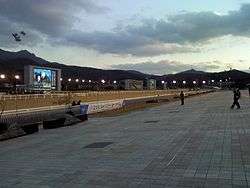LetsRun Park Seoul
LetsRun Park Seoul, also known a Seoul Race Park or Seoul Racecourse Park is a 40,000[1] capacity Korean thoroughbred racetrack in Gwacheon, Gyeonggi-do, South Korea. It is host to many of Korea's most valuable thoroughbred horse races including the Korean Derby and Grand Prix. LetsRun Park Seoul is located next to Seoul Racecourse Park Station on Line 4 of the Seoul Metropolitan Subway. It is operated by the Korea Racing Authority (KRA).
 | |
| Location | Gwacheon, Gyeonggi-do, South Korea |
|---|---|
| Owned by | Korea Racing Authority |
| Date opened | 1 September 1989 |
| Course type | Left |
| Official website | |
History
The current site at Gwacheon is the third home of LetsRun Park Seoul. The first was at a track in Sinseol-dong, Dongdaemun-gu, which was in operation from the early 1920s until just after the Korean War. Following the closure of the Sinseol-dong track, a new racetrack was constructed at Ttukseom, on the north bank of the Han River In February 1983, after South Korea was awarded the 1988 Summer Olympics, the KRA was given the task of organising the equestrian events.[2] The Ttukseom Racetrack was inadequate; the KRA acquired a new site south of Seoul in Gwacheon Gyeonggi-do, where the equestrian (except the individual-jumping final) and the riding portion of the modern pentathlon events were held. After the Olympics, the KRA turned the site into a racetrack.[3]
Present
The first race at the new LetsRun Park Seoul was held on 1 September 1989. The track can accommodate more than 80,000 spectators; in 2003 a second grandstand, "Luckyville", was opened alongside the existing "Happyville". Races are run on an oval artificial sand-based track with a two-furlong home straight.[4]
As of 2011 live thoroughbred racing takes place on Saturdays and Sundays all year, with 12 races each Saturday and 11 each Sunday. On race day, races are also simulcast from the pony-racing track on Jeju Island and the thoroughbred track at Busan-Gyeongnam. Major races at the LetsRun Park Seoul include the Korean Derby in May, the Minister of Agriculture Cup in October, the President's Cup in November and the season-ending Grand Prix in December.
In 2007, the Korean-bred J.S. Hold won the Korean Triple Crown (the Ttukseom Cup, the Korean Derby and the Minister's Cup) at LetsRun Park Seoul. In 2008 the Ttukseom Cup was replaced as the first leg of the Triple Crown by the KRA Cup Mile, which is run at Busan-Gyeongnam Race Park on the first Sunday in April.
In 2009 the champion jockey at LetsRun Park Seoul was Park Tae Jong, who also holds the record for most wins in Korean racing history. The 2009 Korean Derby was won by a filly, Sangseung Ilro, who had previously won the KRA up Mile at Busan-Gyeongnam. At the end of each season, racing fans in Korea can vote for which horses they wish to take part in the traditional season-ending Grand Prix race. In 2009, the American-bred Dongbanui Gangja won the race for the second consecutive year.
Notable races
| Month | Racename | Distance | Qualification |
|---|---|---|---|
| Grade I | |||
| May | Korean Derby | Dirt 1800m | Korean 3yo c&f |
| Sep | Korea Sprint | Dirt 1200m | International 3yo+ |
| Sep | Korea Cup | Dirt 1800m | International 3yo+ |
| Nov. | Presidents Cup | Dirt 2000m | Korean 3yo + |
| Dec. | Grand Prix | Dirt 2300m | Mixed 3yo + |
| Grade II | |||
| Oct. | Minister of FAFF Cup | Dirt 2000m | Korean 3yo c&f |
| Grade III | |||
| Apr. | Ttukseom Cup | Dirt 1400m | Korean 4yo + |
| Jun. | SROA Chairman's Trophy | Dirt 2000m | Korean 4yo + f |
| Oct. | KRA Cup Classic (Handicap) | Dirt 2000m | Mixed 3yo + |
| Nov. | Breeder's Cup | Dirt 1300m | Korean 2yo c&f |
See also
References
- "StadiumZone - Home". Stadiumzone.weebly.com. Retrieved 13 June 2017.
- "Archived copy". Archived from the original on 22 July 2011. Retrieved 17 January 2010.CS1 maint: archived copy as title (link)
- 1988 Winter Olympics official report. Volume 1. Part 1. pp. 188–9. La84foundation.org
- "Seoul Racecourse Park | Horse Racing in Korea". Korearacing.wordpress.com. 15 February 2010. Retrieved 13 June 2017.
External links
| Wikimedia Commons has media related to Seoul Racecourse. |

